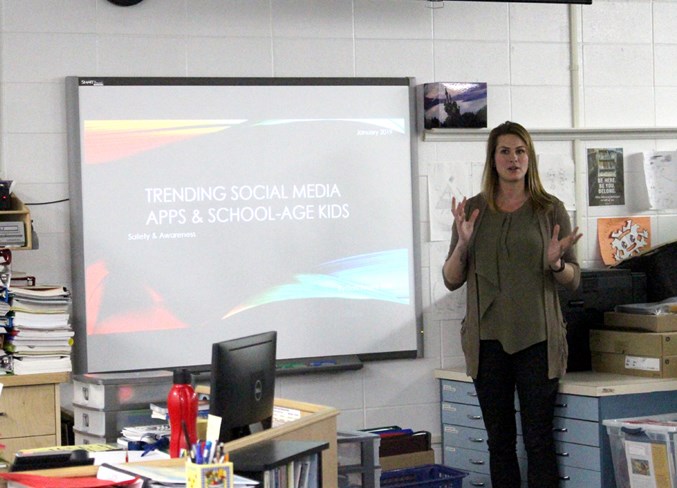With the Internet constantly changing, local parents learned about the dangers facing their children and how to address online activity.
During H.E. Bourgoin Middle School’s Parent Social Media Night on Wednesday, April 24, families learned the ins and outs of popular apps, the negative effects of too much screen time, and how to protect their children when it comes to Internet use.
School principal Jeannine Ellis said, ”Social media is something that (youth are) a part of, and they get cellphones to text mom and dad where they are and (for their) safety. Now, it’s just helping parents to make sure that it’s a tool that they’re using responsibly.”
Local parent Jackie Beers attended the information session in order to learn where she can look for more information about apps that her children use.
”It’s changing so often, and the things that I know or may look for in their iPads and stuff, maybe I don’t know exactly what I’m looking for.”
Ellis stressed the importance of educating youth on how to properly use their devices.
She explained, “They’re great. We use them every day, but it’s just learning how to use them correctly and making sure, as parents, that we’re informed of what’s going on.”
Another subject covered was teaching children that their actions online can have long-term impacts on themselves and others.
”We’re worried about what kids are putting out there when they don’t have the forethought to make good choices,” detailed H.E.B.’s student advisory counsellor Dani Angell. “We’re also worried about what they’re seeing, because they can go and click on something and it’s live.”
Angell discussed popular programs among middle school students, such as Tik Tok, an app that combines videos with music, and Houseparty, where users can connect with strangers to chat via live streaming.
By using these apps, some youth can get into trouble with sexting and cyberbullying.
”These kids don’t understand. ‘Oh, I’m 13 and I took this picture and I decided to click send.’ Okay, you’re at an age where you legally can’t consent to click send on that picture, so you can still be charged,” said Bonnyville RCMP Cst. Megan Letang, who agreed with Angell that having open communication can assist in teaching children about the issues surrounding online activity.
”The best way we can deal with youth and the Internet... is just education and open communication. If we just talk to kids about what they’re doing online, why they feel that they need to do certain things, or be on these apps... It’s more than we’re all learning, and none of us knows what all the apps are out there, or the dangers they have,” Letang detailed. “But, if we talk to them and understand why they’re using them, it helps and encourages them to come and talk to you when they’re facing a real issue, because you never want to close that door in case it gets a lot worse.”
Modelling good online behaviour was another suggestion.
Angell explained, “(Kids) learn through watching you, watching everyone. Observation is one of the main methods of learning. They’re not going to be able to distinguish whether that’s a good choice mom or dad made, or a bad choice.”
As a result of all the time students spend on their phones, occupational therapist with Northern Lights Public Schools (NLPS), Rachel Boychuk, touched on how extended periods of time on devices can affect brain development.
”I’m not saying completely cut it out, because we all know that technology is part of our everyday lives, but just having that awareness and balance between screen time and doing other hands-on activities, like being outdoors, playing sports, and being active (for) 60 minutes a day.”
Boychuk has seen a rise in referrals for students with ADHD-like symptoms, and believes it’s related to the amount of time spent online.
For Beers, the session was a good opportunity to learn about a subject that has a huge impact on her children’s lives.
”I think it’s good, because we can take a time out for a second, and there’s lots of stuff on the Internet to read. When there’s something like this, you can actually plan to sit down and learn about it as opposed to, ‘I’ll read that article later.’”



